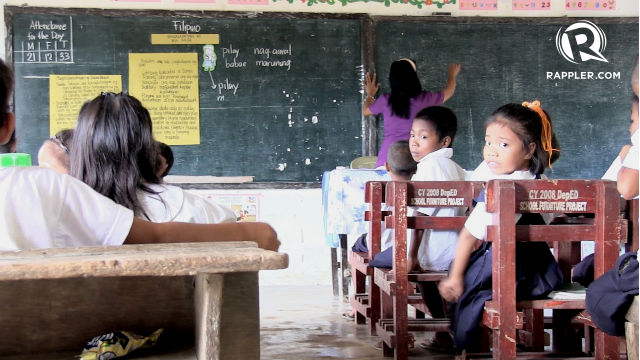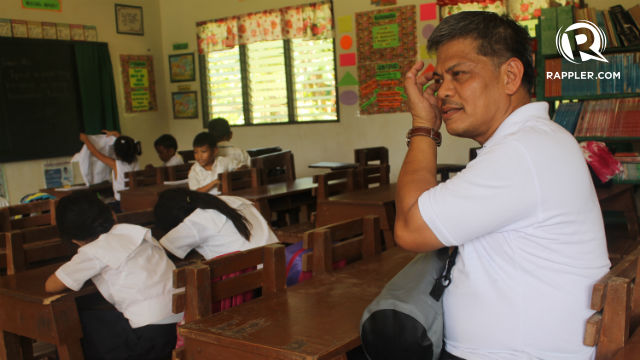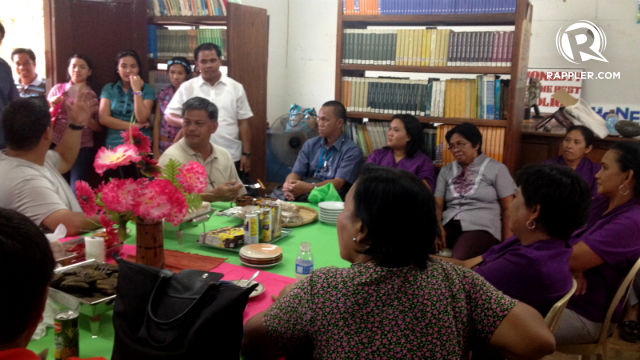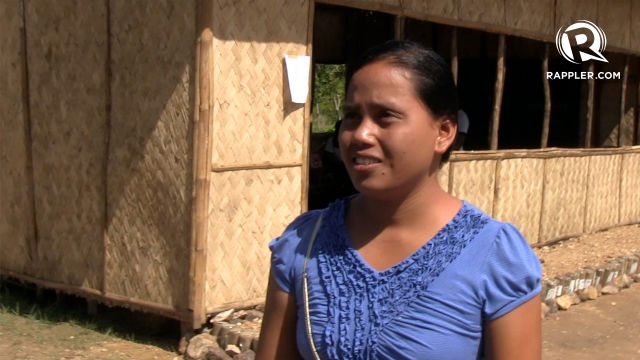SUMMARY
This is AI generated summarization, which may have errors. For context, always refer to the full article.

PALAWAN, Philippines – With the sun just over the horizon, its rays slowly creeping above the distant mountaintops, we leave the makeshift pier and head off to another part of Culion Island in Palawan. As our boat cuts smoothly through the almost still water, we each take a spot where we will sit for the next 45 minutes or so.
We, along with a team from the Department of Education (DepEd) and news crews from Rappler and GMA, are on the way to Lumber Camp Elementary School in Bgy de Kalabaw, Culion for the opening of the first day of the school year.
Br. Armin Luistro, FSC, the Secretary of Education, sits at the front of the boat and looks out at the expanse beyond us. His choice of seating is probably not by accident. He is at the helm of the government’s largest bureaucracy, overseeing more than 670,000 teachers scattered across some 46,000 public schools nationwide.
As the country’s chief principal, he is responsible for fixing a troubled educational system that has long been the subject of countless ‘reforms’ over the years. However, this time—his time—is different, he says.
This year, the K-12 Law was passed, institutionalizing universal kindergarten and two more years of secondary school despite criticism. It is also this year that the mother tongue (MT) will be used as a medium of instruction from grades 1 to 3 instead of English or even Filipino. These are just some of the innovations that the department under Luistro hopes will foster a learner-centered educational system.

Islands of learning
Lumber Camp Elementary School is located in a remote part of Culion mainly accessible by boat. It has 4 classrooms for some 300 students. Thanks to some donors from La Salle Lipa, the school will get 3-4 new classrooms this year. In the meantime, the grade 1 and 2 classes and the grade 3 and 4 classes share rooms. Teachers strain their voices to speak on top of each other or take turns to talk.
It is here that Luistro joins the flag raising ceremony. It is here that he tells the students, “hindi kayo nakakalimutan ng ating gobyerno.” (You have not been forgotten by our government.)

Remembering the forgotten. This seems to be the common theme of the series of school visits we observe through the course of the 3 days on the island. Culion was once a leper colony where the afflicted where forcefully removed from their homes and dumped on the island. Only those who gave respite—the priests, the doctors and nurses, the religious sisters and brothers—were allowed on and off the island. Today, though it is a thriving community, there is still a stigma associated with the island and its once abandoned and forgotten inhabitants.
Local teachers tell us that the Secretary’s visit, which brings with it the department’s top officials, is special because very few government officials visit the remote island. The point is driven home when Luistro asks the students who the president of the Philippines is and they fumble.
Luistro hopes that by visiting Culion, he is sending a message that his DepEd cares for even the farthest of schools. But his visit is also a reminder of what the government has failed to do for the education of our children throughout the years. Dilapidated classrooms, unqualified teachers, and poorly motivated students are just some of the complaints that constantly hound the Department.
“I know that a visit from a high official is ceremonial and I have no illusions that it will solve all of our problems overnight,” says Luistro. “Think of 46,000 schools, 670,000 teachers, just monitoring them is almost an impossible task.”

Innovation
Next to the elementary school, an annex high school was set up last year. The annex high school consists of two make-shift nipa houses. Though crudely constructed, they are actually much cooler under the hot sun than the hollow block classrooms of the neighboring elementary school as there are no walls to trap the heat.
The parents in the community set up the school because they did not want their sons and daughters to have to ride a boat every day to faraway Culion National High School in the main town.
The DepEd normally accommodates requests such as these by assigning teachers to teach in the remote areas. The Department also supplies teachers whenever a local politician erects an annex classroom sometimes a few kilometers away from another existing school.
Rationalization plans
If Luistro were to have his way, however, these types of schools may be closed down or merged with bigger schools. This is part of a longer-term rationalization program that aims to increase “efficiency and quality,” particularly in areas where the size of the class doesn’t justify posting a teacher.
“There was one school with only 30 students from grades 1 to 6,” says Assistant Secretary Rey Laguda, Luistro’s chief-of-staff. Laguda is tasked to map the location of every elementary school in the country to see which schools may be redundant—a plan, he acknowledges, that may not sit well with local politicians and communities.
Luistro is thinking of creating dormitories to house students from distant communities, or providing bicycles or boats for them to get to school. He wants the teachers to come up with innovative ideas as well, and hopes that they—together with the communities they serve—will brainstorm and come up with something creative.
This is the kind of out-of-the-box thinking that seems to characterize Luistro’s style of management. With only 3 years left in President Aquino’s term, the Secretary is in a rush to get these innovations pilot-tested—even if it means ruffling some feathers.
“This is like our K-12 program. One of the criticisms is ‘why do you do it? You’re not ready’” says Luistro. “That’s fine, I think, when we think of it as a conceptual reform. But I come face to face with students who are 5 to 6-year-olds. I can’t tell them, ‘stop growing, wait until we have a solution.’ So we have to do it now. It will not be perfect. It may be makeshift. Maybe we’ll have to refine it the year after. The urgency is there because there are children who are in these communities now.”

Cultural change
In a small group meeting between teachers of Culion National High School (CNHS) and the Secretary, the teachers are asked if they have anything to say to him. Most remain quiet and stare awkwardly at one another. The regional director is jokingly admonishing the principal to shape up the school or risk it being closed. The Secretary just smiles and lets his chief-of-staff do the talking.
Laguda says the Department is facing a dilemma. If they open up a new high school in any of the areas they visited in Culion Island, this could result in a decline in enrollment for CNHS, which in turn would mean some teachers would need to be transferred or let go. If they don’t open up a new high school, students who live in these remote areas may opt not to go to school. No one speaks in favor or against the two proposals.
In Filipino culture, where respect of authority tends to mute individual voices, getting the teachers to speak their minds remains a challenge for Luistro’s DepEd. He acknowledges that they have yet to create an open system that truly empowers the teachers and fosters innovation.
“I’ve always said that part of our big difficulty in our department is that everything moves because of a DepEd memo,” says Luistro, “But when you need inputs from the field, when you need creativity, when you need innovation, when you need judgment what classes would have to be offered, who should we accept, and how do we make sure we can retain them in school, these cannot be done in the central office. The ones leading must be the people in the field.”
Jonalisa Ohana, 25, is a Culion native and a new teacher on her first day at the annex high school. She graduated from the Jesuit-run Loyola College of Culion with a bachelor’s degree in literature. Ohana and her fellow teachers live in a small hut built by the local community; but she doesn’t mind. She would, though, like the Secretary to provide her students with new textbooks to use and a better classroom that will keep them cool under the sun and dry when it rains. This is her simple request. Curriculum reform and other innovations are best left to the higher officials.

We are now in the 10th school visit in 2 days. Each school has a different story to tell, and indeed, different needs. Luistro and his team are busy ticking off to-do lists for the repainting of buildings or application of relevant local content to the curriculum. He is tired but never shows it.
“Despite the image of bureaucracy and DepEd, you hear that all over—teachers selling longganisa and all—I have seen the best Filipino souls teaching in our schools. And if only for that, I’ll come back and visit.”
For Luistro and the DepEd, the battle for quality education is being fought one classroom, one teacher, and one student at a time. – Rappler.com
Editor’s note: Rappler, along with GMA, was invited by the Department of Education to cover the start of the school year in Culion, Palawan.
Add a comment
How does this make you feel?
There are no comments yet. Add your comment to start the conversation.